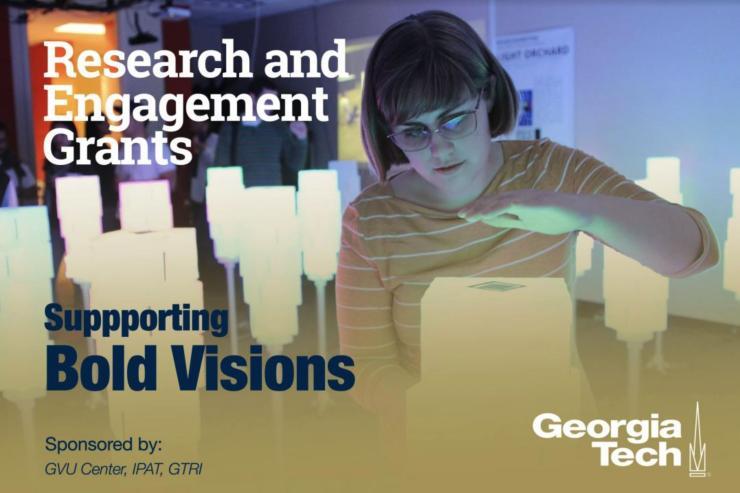GVU IPaT Research and Engagement Grant Winners Announced
Aug 29, 2022 — Atlanta, GA

Research and Engagement Grants
Earlier this summer, the GVU Center and the Institute for People and Technology (IPaT), with additional support from GTRI, announced the call for proposals for Research and Engagement Grants for 2022-2023. As in past years, they are supporting two separate types of grant proposals: Research grants that will provide seed funding for new research collaborations, and engagement grants that will provide support for new forms of internal and external community engagement and collaboration.
Congratulations to the three winning grants comprised of five faculty members, and one graduate student. Each team’s project focus and members are as follows:
- Proposal to host a series of electronic music artist residencies to create awareness and additional pathways for STEAM learning. Financial support for the project is being provided by GTRI through the STEM@GTRI program, in partnership with GVU and IPaT. Awardees are Noura Howell, assistant professor, in digital media at Georgia Tech; and Alexander Cohen, technical director of the School of Music at Georgia Tech.
- Proposal for a study of a user-centered approach of deep-fake detection aid design. Awardees are Zachary Tindler, graduate student in the School of Psychology in the College of Sciences; Richard Catrambone, professor of psychology in the College of Sciences; and John Stasko, Regents Professor and interim school chair in the School of Interactive Computing.
- Proposal to establish a media arts residency. Awardee is Yanni Alexander Loukissas, associate professor of digital media in the School of Literature, Media and Communication.
About the Grants
RESEARCH GRANTS
Research Grants will provide seed funding to conduct interdisciplinary research. The objective of the Research Grant program is to promote research activities involving faculty and students from the many disciplines represented in GVU and IPaT. We seek bold new work that by its preliminary nature would be difficult to fund through ordinary channels. Preference will be given to early-stage research with a high probability of leading to extramural funding, and with a strong interdisciplinary component. All funds must be spent by the end of the spring semester.
Research Grant proposals can be either single-semester (fall or spring) or academic year (fall and spring) duration. We expect most research proposals will request funding for a GRA between ⅓ and ½ time for the proposal duration. Proposals can also request research faculty time; in these cases, it is highly encouraged but not required to collaborate with academic faculty as well as GTRI research faculty. Proposals from academic faculty can request other critical resources, such as materials and supplies, but cannot include academic faculty salary support.
ENGAGEMENT GRANTS
Engagement Grants are designed to foster new sorts of engagements and collaboration, whether internal or external to Georgia Tech. Examples of potential engagement grants could include:
• Support for an artist-in-residence (or X-in-residence) program
• Support for new sorts of community engagements, such as installation spaces or "pop up" displays of research
• Support for new faculty and student workshops, seminars or social events
• Support for new undergraduate "hack fests" or laboratories




